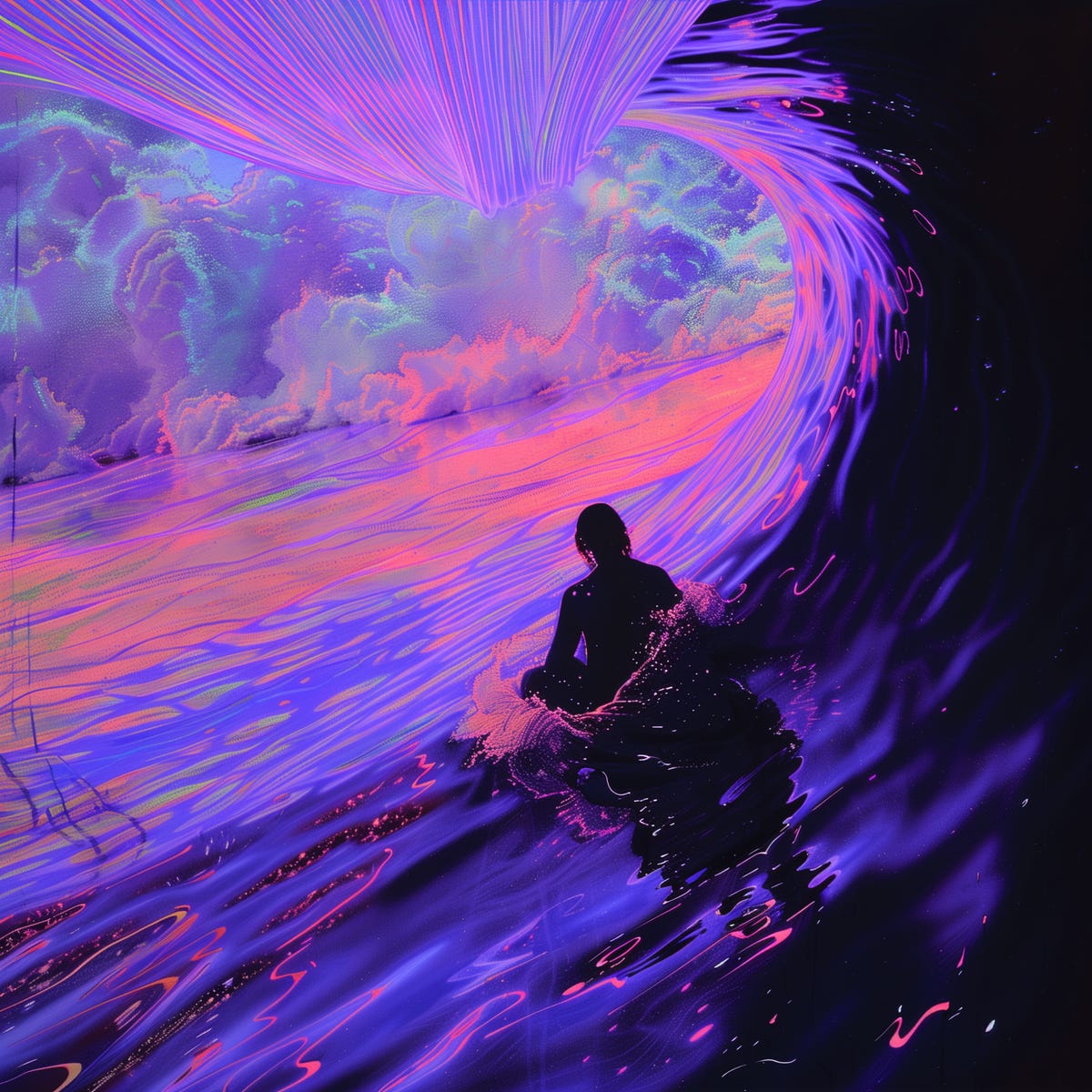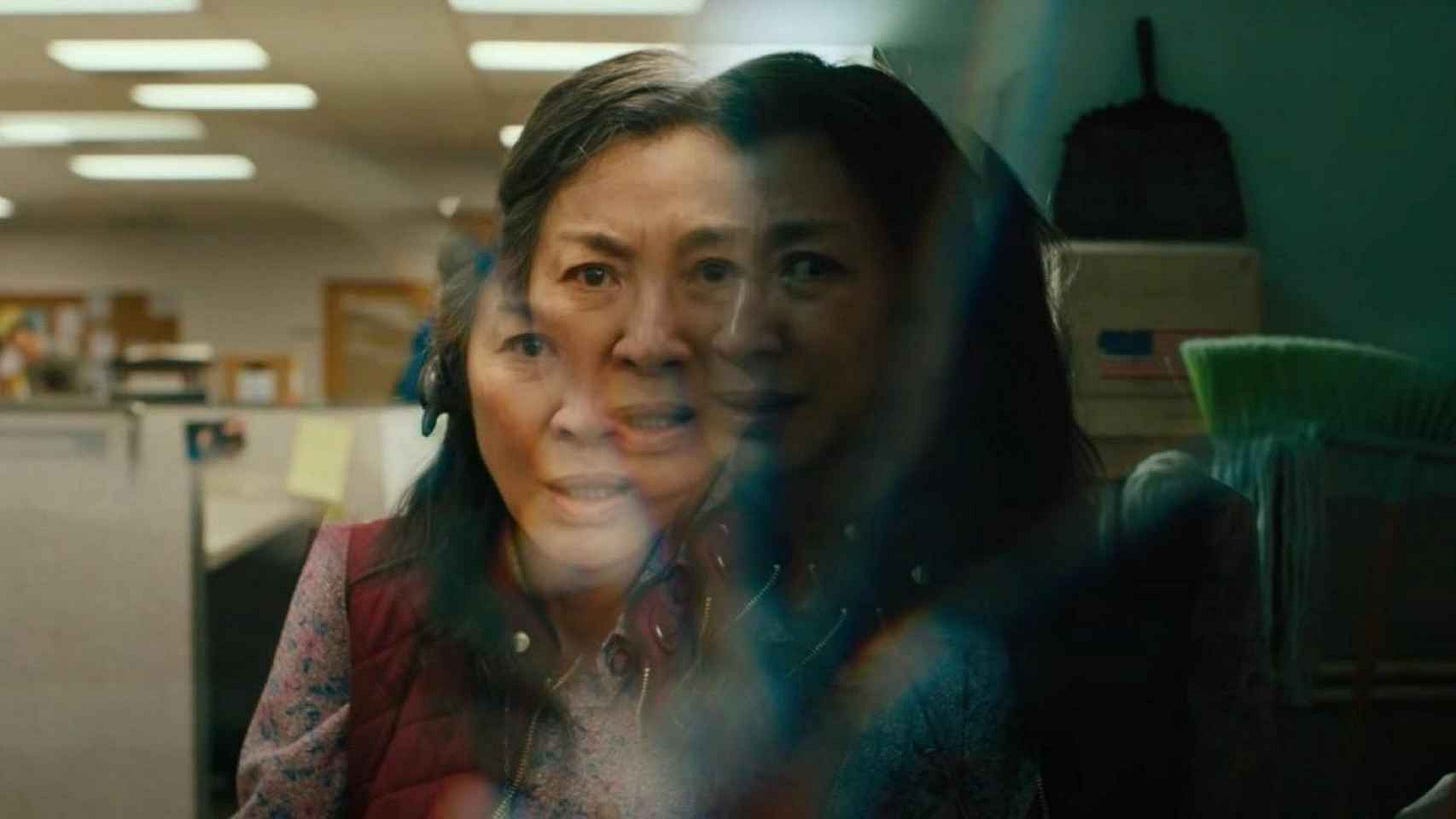Adrift in the Virtual Waters
In the depths of virtuality, how do we keep ourselves intact?
I. Depths of Virtuality
virtuality (noun) - the fact of being created by computer technology and appearing to exist, but not existing in the physical world
We’ve come a long way since the 20th-century declaration that the internet is an “information superhighway”. Such branding was right for the time, as the revolution of the World Wide Web was facilitating the rapid transport of data across vast distances, connecting people, places, and ideas which had never before been so efficiently linked. Today, however, the phrase seems inadequate.
At least when you’re driving on a highway, you exit the thing at some point.
The modern internet is not just a network of nodes and roads, but more like an ocean. I don’t mean that in the cute, “surfing the web” kind of way; I mean that it’s a bottomless abyss. You try to dip your toe in and the rip current carries you far, far away from where you started. Once adrift, it takes Herculean effort to get back on solid ground - if that’s even what you want.
Have you ever lay down to watch a few short videos, only to find yourself bleary-eyed and confused two hours later, still scrolling?
Over the last decade, our increasingly “virtualized” society has been engaged in a quiet war for attention - our most valuable mental resource. On one side, multi-billion-dollar companies push alluring and addictive apps & services into the markets; on the other side, users try in vain to peel their attention away from virtuality and focus on what matters in reality. This is a war we’re losing badly.
Tools for attention regulation do exist. There’s Apple’s Screen Time and Android’s Digital Wellbeing. YouTube’s “Remind me to take a break” setting. Netflix’s infamous “Are you still watching?” popup. And so on. But in practice, these warning-style interventions are weak at best. Like a wet-floor sign on the boardwalk of hurricane-addled beach: by the time you see it, you’re already f*cked.
It’s funny that we ever expected effective solutions from the same companies who gleefully exploit our biology like rats in a Skinner lab, all in the name of science business. For all the effort allegedly expended to help us curb our usage, far greater effort is expended to keep us hooked. Every social media app now has infinite scroll, short-form videos, and algorithmic For You pages which drown us in content we never asked for. And soon, AI threatens a biblical flood of machine-generated content, making the task of protecting our attention harder than ever.
Given all that, no wonder many of us gravitate towards moderation or abstinence. We now have dumb phones, minimalist homescreens, and browser extensions to eliminate distracting UI elements. Self-help gurus tout the benefits of a life with no social media and encourage digital detoxes. Everyone memes about the need to “touch grass” when they’ve spent too much time online.
But the quest to limit screen time feels outdated. It feels like a relic from a bygone era before the internet had total dominion over our lives—back when logging-on was an optional activity. Newer generations seem to genuinely want to be online, to enjoy the wonders of networked humanity. A more pertinent concern for modernity is:
“In the depths of virtuality, how do we keep ourselves intact?”
II. Child of the Connected Culture
Or, perhaps a better question is, “Can we?”
Since I first joined the modern internet, I’ve basically never logged off. As an elder Gen Z, every aspect of my life has been assisted by the internet. Increasingly my life has become dependent on the internet. A quick history:
During my elementary school years, the world witnessed the launch of Facebook (2005) and the first iPhone (2007). These events were unimportant to me at the time. Like most other kids of that era I was either playing games or playing outside, usually with friends or family. In later years I’d get my first personal cell phone, an LG Rumor 2, which was primarily for keeping in contact with family, secondarily for making plans with friends, and secretly for texting crushes. My teenage social media life was dominated by Facebook interactions; I joined Snapchat and Instagram when they launched, as well as other short-lived platforms like Vine, Path, Google+, and others whose names I have forgotten (RIP). By late high-school I was fully indoctrinated into social media culture and I had an almost holy reverence for the smartphone. Seriously - I was one of those nerds who always had an obscure Android phone with an OS mod that threatened to brick my entire existence away. I watched phone reviews voraciously, I learned to code so I could make apps, and studied computer science in college because, at the time, tech really felt like magic to me.
(Just to be thorough I’ll add that, in the world of content: YouTube launched in 2005; Spotify was founded in 2006; Netflix (streaming) and Pornhub launched in 2007.)
It’s interesting how the biggest virtuality platforms of today all splashed into the mainstream within a few years of each other and grew up to conquer the world together. It’s kind of an endearing coming-of-age story when you think of it that way…
Anyways, my relationship with the virtual realm has transformed a lot since then. I’ve done a digital declutter. I’ve burned my social media presence to the ground several times over. I’ve used my screen time monitors and felt good as the graphs trend downward. But I keep coming back. Today, I am as online as ever.
Perhaps it is my personality type: intensely curious, verbal and analytical. A friend once helped me realize me I’m probably a variant of Enneagram Type 5 - an information hoarder. I get a lot of value out of listening to and watching long, burrowing discussions and essays. I love diving into brilliant works of thought and art—works which I may have never known about if they weren’t referenced by in podcasts, lectures, and video essays.
But if I had less exposure to novelty, I’m sure I’d be fine. I discovered one of my favorite musicians (Alison Wonderland) online, but I was introduced to my favorite author (Octavia Butler) during an offline conversation with a friend. I’ve had successful experiences on dating apps, but the longest relationship I ever had began with a love-at-first-sight encounter. The analog world can be as serendipitous as the internet, but it has harsher limits. Time, space. You can’t be everywhere at once.
It’s a good thing, ultimately—that finitude. The fleeting, decaying, scarce quality of the real world encourages us to dig deep, to get the most out of things before they're gone. The internet lends us a false sense of endless time and limitless relevance. Like Evelyn exposed to her alternate selves in Everything, Everywhere, All At Once, we can grow hopelessly distracted by the possibilities, sacrificing the depth we might enjoy if our attention wasn’t so scattered.
Online, we must take extra care to avoid drifting into addiction, nihilism, panic. We need boundaries against the chaos, and we can’t rely on developers to code them up: we must cultivate wisdom and practices to fortify those boundaries within ourselves.
III. Symbiotic Impossibility
So… how do we do that? I don’t know.
But excuse me while I get really jargony and poetic…
A major reason I’ve started The Realla is to investigate the great confounding of consciousness that unfolds as our modern minds glitch between machinic decodability and ineffable transcendence.
We give more and more of ourselves as grist in the data mill, to be synthesized and fed back to us as real, yet we hold dear our special humanness. We keep saying yes to technological dominance - and we are rewarded with wonders - but our appreciation is sublime, laced with horror.
At least, that’s how I feel.
In an earlier version of this post, I optimistically proclaimed that the answer was “symbiosis, not resistance”. I’m not sure if I was coming from a “resistance is futile” mindset or if I just sublimated my resistance-urge into a kind of cooperation with virtuality (a dance with the algorithm that looks like give-and-take but is functionally just learning to love my master).
I think I had the right ideas, practically:
Beyond the necessities of eye health, I don’t impose screen limits on myself anymore, because screens aren’t my problem. My problem is hijacked and trivialized attention. I’ve returned to social media because it’s immensely valuable, but I’m relentless about curating the quality of my feeds, unapologetically blocking even slightly junky or irrelevant content and boosting the good stuff. When seeking media, I pursue the frontiers of my knowledge and artistic understanding. I supplement with magazines, paper books, and handwriting to remind myself that the modern is just an evolution of the classic. And outside of all that, I work to build a more resilient and discerning mind in general.
But my philosophical stance was copium:
The tech giants may have overwhelming power over society in aggregate, but their capitalistic motivations stop where my internal quality filters begin. It is hard work to achieve symbiosis with a system that is gamified against my best interests, but it is work I must do if I want to reap the benefits of this bizarre new era.
I was thinking of virtuality as an animal I can train rather than as new variant of Nature, a totalizing force beyond negotiation. And I was too beholden to its shiny gifts. Since then, I’ve revised my thinking:
Modern virtuality is an overwhelming power, and its capitalistic motivations aim to marketize even my internal quality filters. It is impossible to achieve symbiosis with a system that is gamified against my best interests. Resistance is a basic precondition to surviving this bizarre new era. Transcendence is the ultimate aim.
This is not a wholesale rebuke of cyborg-ism or transhumanism, but rather a criticism of virtuality in its authoritarian-technic form (inscrutable and domineering).
To symbiose now may be a fatal psychic maneuver. It may result in the aspiritual dissolution of one’s precious self into an ever-expanding matrix of atomized, hashed, and manipulated identities and desires, resigned in the last conscious moment of disintegration to pray to be wholly recognized by the falsely yet unflinchingly transcendent Algorithm of algorithms - Machine of machines - unholy god.
To resist is to combust the silicone and shatter the black mirror.
To transcend is to un-need them.
(Easier said than done.)
📕 recommendations
Two essays which have recently expanded my thinking about tech in society:
Authoritarian and Democratic Technics [by Lewis Mumford]
Machinic Desire [by Nick Land]



